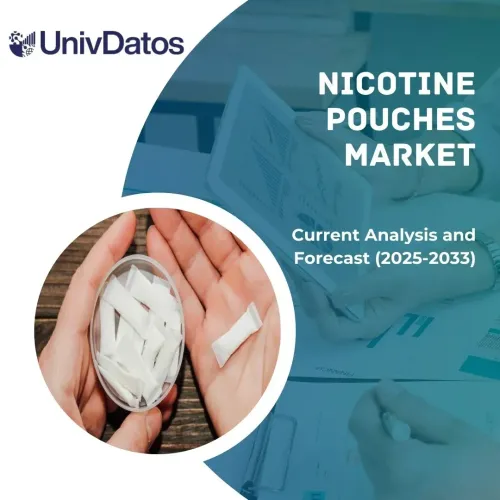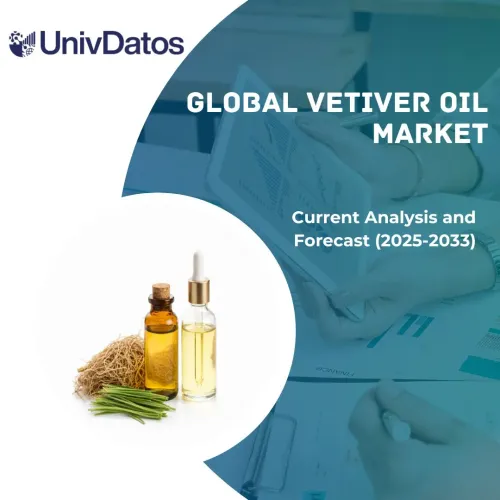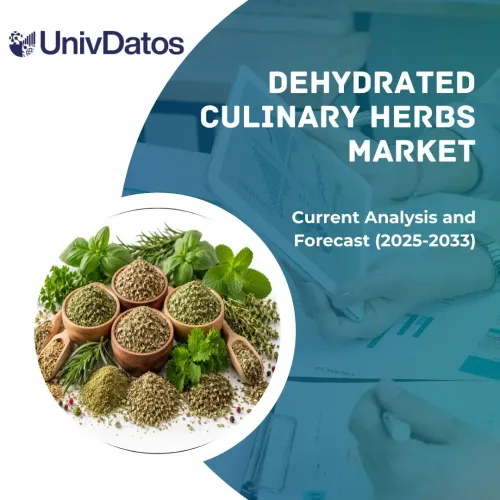- Home
- About Us
- Industry
- Services
- Reading
- Contact Us
Food Enzymes Market: Current Analysis and Forecast (2021-2027)
Emphasis on Type (Carbohydrase, Protease, Lipase, Others); Form (Solid, Liquid); Sources (Microorganism, Animals, Plant); Application (Bakery, Confectionary, Dairy & Frozen Dessert, Meat, Poultry & Seafood Products, Beverages, Others); Region/Country
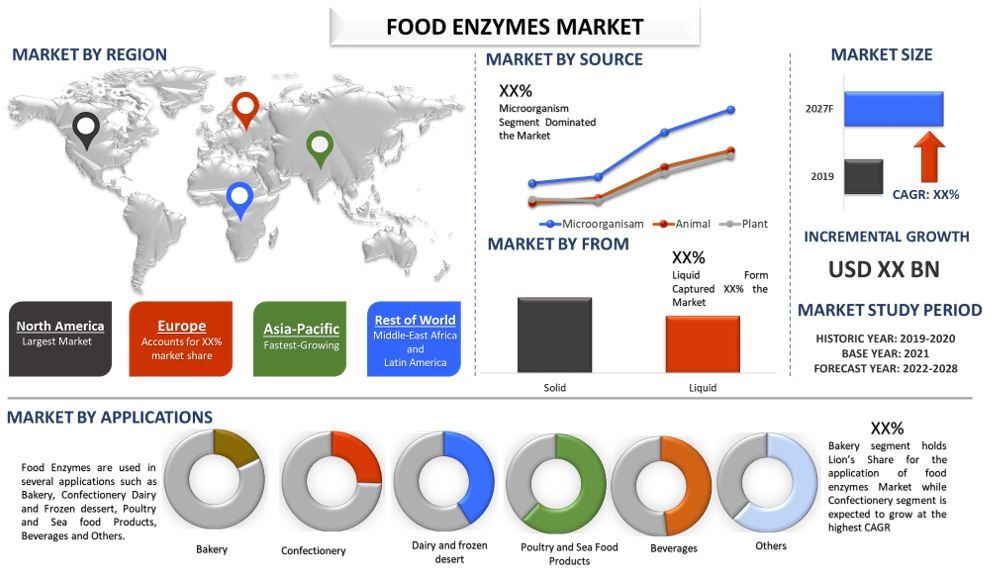
Food Enzymes Market was valued at US$ 2 billion in 2020 and is expected to grow at a CAGR of 6% over the forecast period (2021-2027). The demand for Food Enzymes is on the rise owing to the rising per capita incomes in developing countries, which will result in strong gains in enzymes associated with the production of food and beverages, cleaning products, and animal feed. Rising per capita incomes will support consumer demand for higher-value goods, such as gluten-free, low-fat food products, which would drive the demand for the food enzymes.
Also, the trending adoption of western culture in the countries of the Asia-Pacific region would drive the demand for meat, baked goods, and dairy products will continue to rise among emerging middle-class populations. In turn, these foods will be increasingly produced using enzymes, both in animal feed and in food processing applications
The flourishing food processing industry, coupled with the growing consumer awareness for nutritional products, is the key factor driving the growth of the food enzymes market. A rise in the demand for nutrient-rich and high-quality food and beverages was witnessed in the past few years. Moreover, shifting the dietary preferences of consumers toward natural, organic, and chemical-free food has improved the adoption of food enzymes. Also, the promulgating demand for frozen and processed food products is favoring the market growth. Consumers are increasingly opting for on-the-go and convenience food products owing to their changing lifestyles and busy schedules.
Value of organic packaged food consumption in the United States from 2016 to 2022 (in billion U.S. dollars)
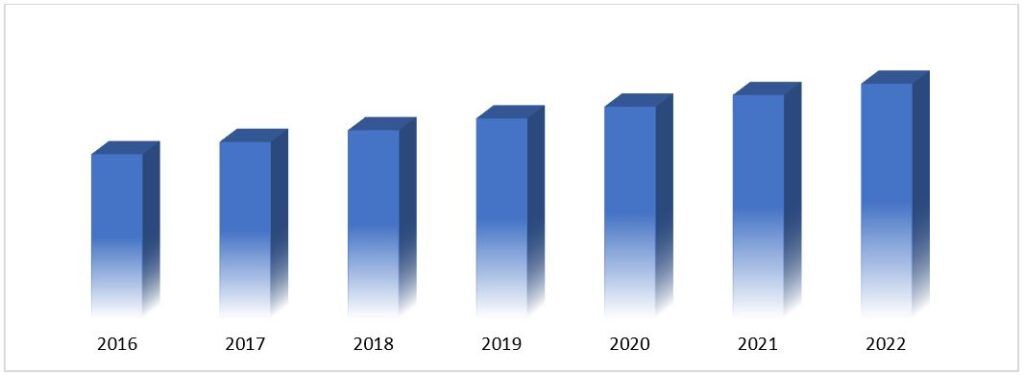
DuPont, Associated British Foods plc, DSM, Novozymes, and Kerry Group, Advanced Enzyme Technologies Ltd, Amano Enzyme Inc., and CHR. Hansen Holdings A/S. etc, are some of the prominent players operating in the Food Enzymes market. Several M&As along with partnerships have been undertaken by these players to facilitate customers with hi-tech and innovative products.
Insights Presented in the Report
“Amongst Type, Carbohydrase segment holds the major share”
Based on the Type, the market is fragmented into Carbohydrase, Protease, Lipase, and Others. The Carbohydrates segment of the Global Food Enzymes market grabbed the major market share and dominated the market. The segment captured around XX% market share and generated USD XX Mn in 2020 and is expected to grow at a CAGR of XX% during the forthcoming years
“Amongst Form, Liquid segment to dominate the market during the forecast period”
Based on the form type, the market is mainly fragmented into Solid and Liquid. The Solid segment grabbed XX% market share and captured US$ XX Mn in 2020. Moreover, the market of this segment is expected to proliferate with a CAGR of XX% in the forthcoming coming period of 2021-27. However, the liquid segment is expected to witness exhibit growth in coming years owing to the benefits such as less time to break down, flexible quantity.
“Amongst Sources, Microorganism segment grabbed Major Market share in 2020”
Based on sources, the market is mainly fragmented into Microorganism, Animals, and Plant. In 2020, the microorganism segment grabbed the major market share and dominated the market. The segment gathered an XX% revenue share in 2020.
Amongst Application, Beverage segment grabbed Major Market share in 2020”
Based on Application, the market is mainly fragmented into Bakery, confectionary, Dairy and frozen dessert, Meat, Poultry and seafood products, Beverages, and Others. In 2020, the bakery segment grabbed XX% market share. The segment gathered an XX% revenue share in 2020. However, the poultry and seafood product segment is expected to witness an exhibit growth during the forecast period
“North America represents one of the largest markets of Food Enzymes market”
For a better understanding of the market dynamics of the Food Enzymes market, a detailed analysis was conducted for different regions across the globe including North America, Europe, Asia Pacific, and the Rest of the world. North America dominated the market and generated revenue of US$ XX Million in 2020 owing to the change in lifestyle and growing demand for organic and processed food.
Reasons to buy this report:
- The study includes market sizing and forecasting analysis validated by authenticated key industry experts
- The report presents a quick review of overall industry performance at one glance
- The report covers an in-depth analysis of prominent industry peers with a primary focus on key business financials, product portfolio, expansion strategies, and recent developments
- Detailed examination of drivers, restraints, key trends, and opportunities prevailing in the industry
- The study comprehensively covers the market across different segments
- Deep dive regional level analysis of the industry
Customization Options:
The Food Enzymes Market can further be customized as per the requirement or any other market segment. Besides this, UMI understands that you may have your own business needs, hence feel free to connect with us to get a report that completely suits your requirements.
Table of Content
Analyzing the historical market, estimation of the current market, and forecasting the future market of the Food Enzymes Market were the three major steps undertaken to create and analyze the demand for Food Enzymes across major regions. Exhaustive secondary research was conducted to collect the historical market numbers and estimate the current market size. Secondly, to validate these insights, numerous findings and assumptions were taken into consideration. Moreover, exhaustive primary interviews were also conducted, with industry experts across the value chain of the Food Enzymes market. Post assumption and validation of market numbers through primary interviews, we employed a top-down/ bottom-up approach to forecast the complete market size. Thereafter, market breakdown and data triangulation methods were adopted to estimate and analyze the market size of segments and sub-segments the industry pertains to. Detailed methodology is explained below:
Analysis of Historical Market Size
Step 1: In-Depth Study of Secondary Sources:
Detailed secondary study was conducted to obtain the historical market size of the Food Enzymes through company internal sources such as annual reports & financial statements, performance presentations, press releases, etc., and external sources including journals, news & articles, government publications, competitor publications, sector reports, third-party database, and other credible publications.
Step 2: Market Segmentation:
After obtaining the historical market size of the Food Enzymes market, we conducted a detailed secondary analysis to gather historical market insights and share for different types, Forms, Sources, and applications for major regions. Major segments included in the report are Type, Form, Source, and Application. Further region and country-level analyses were conducted to evaluate the overall adoption of Food Enzymes across the globe.
Step 3: Factor Analysis:
After acquiring the historical market size of different segments and sub-segments, we conducted a detailed factor analysis to estimate the current market size of Food Enzymes. Further, we conducted factor analysis using dependent and independent variables such as surging health awareness, hectic lifestyle, growing demand for clean label organic food, etc., A thorough analysis was conducted for demand and supply-side scenarios considering top partnerships, merger and acquisition, business expansion, and product launches in the Food Enzymes industry across the globe.
Current Market Size Estimate & Forecast
Current Market Sizing: Based on actionable insights from the above 3 steps, we arrived at the current market size, key players in the Food Enzymes market, and market shares of the segments. All the required percentage shares split, and market breakdowns were determined using the above-mentioned secondary approach and were verified through primary interviews.
Estimation & Forecasting: For market estimation and forecast, weightage was assigned to different factors including drivers & trends, restraints, and opportunities available for the stakeholders. After analyzing these factors, relevant forecasting techniques i.e. bottom-up/ top-down approach was applied to arrive at the market forecast about 2027 for different segments and subsegments across the major markets globally. The research methodology adopted to estimate the market size encompasses:
- The industry’s market size, in terms of value (US$) and the adoption rate of Food Enzymes across the major markets domestically
- All percentage shares, splits, and breakdowns of market segments and sub-segments
- Key players in the Food Enzymes market in terms of services offered. Also, the growth strategies adopted by these players to compete in the fast-growing market
Market Size and Share Validation
Primary Research: In-depth interviews were conducted with the Key Opinion Leaders (KOLs) including Top Level Executives (CXO/VPs, Sales Head, Marketing Head, Operational Head, and Regional Head, Country Head, etc.) across major regions. Primary research findings were then summarized, and statistical analysis was performed to prove the stated hypothesis. Inputs from primary research were consolidated with secondary findings, hence turning information into actionable insights.
Split of Primary Participants in Different Regions
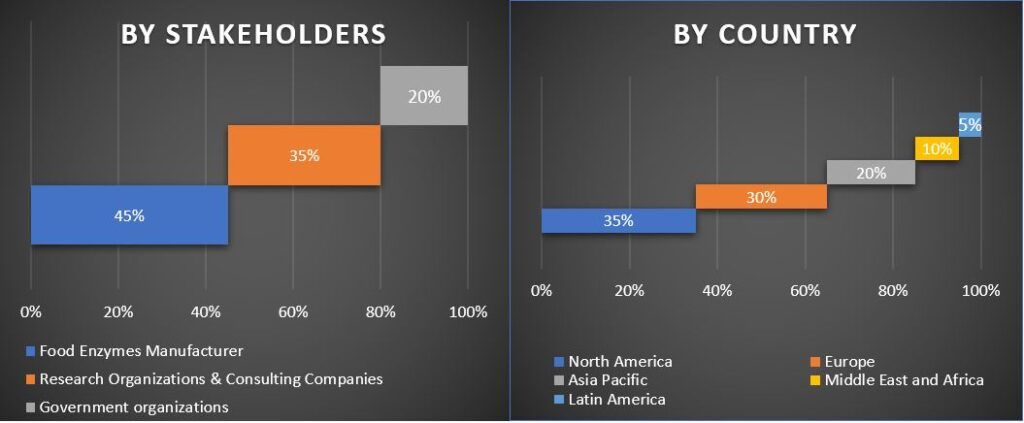
Market Engineering
Data triangulation technique was employed to complete the overall market estimation and to arrive at precise statistical numbers of each segment and sub-segment of the Food Enzymes market. Data was split into several segments & sub-segments post studying various parameters and trends in the areas of Type, Form, Source, and Application of the Food Enzymes market.
Main Objective of the Food Enzymes Market Study
The current & future market trends of Food Enzymes were pinpointed in the study. Investors can gain strategic insights to base their discretion for investments from the qualitative and quantitative analysis performed in the study. Current and future market trends were determined the overall attractiveness of the market at a regional level, providing a platform for the industrial participant to exploit the untapped market to benefit as a first-mover advantage. Other quantitative goals of the studies include:
- Analyze the current and forecast market size of Food Enzymes in terms of value (US$). Also, analyze the current and forecast market size of different segments and sub-segments
- Segments in the study include areas of type, form, source, and application
- Define and analysis of the regulatory framework for the Food Enzymes industry
- Analyze the value chain involved with the presence of various intermediaries, along with analyzing customer and competitor behaviors of the industry
- Analyze the current and forecast market size of the Food Enzymes market for the major countries
- The major region studied in the report includes North America, Europe, Asia- Pacific and Rest of the World.
- Company profiles of the Food Enzymes market and the growth strategies adopted by the market players to sustain in the fast-growing market
- Deep dive regional level analysis of the industry
Related Reports
Customers who bought this item also bought


